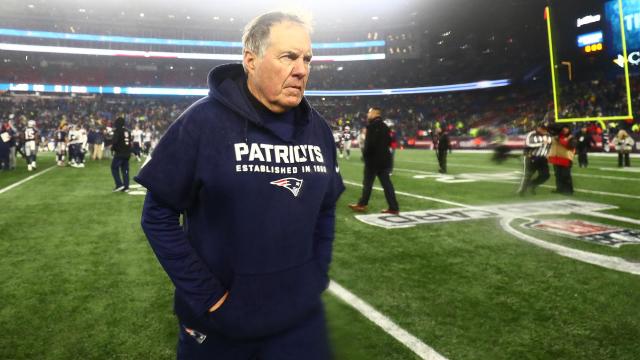Why Belichick declined Medal of Freedom
Mike Florio and Peter King dig deeper into the reason for Bill Belichick declining the Presidential Medal of Freedom from President Donald Trump.
Video Transcript
MIKE FLORIO: Time now for "PFT" on Yahoo Sports. Peter King and Mike Florio with some of the top stories in the National Football League. And it's playoff time, but sometimes teams that aren't in the playoffs generate some news. And the news came out over the weekend that Patriots coach Bill Belichick would be receiving on Thursday of this week the Presidential Medal of Freedom from Donald Trump, less than a week before Trump is out of office. And it created a backlash given the events of last week that happened at the US Capitol.
Belichick issued a statement, Peter, on Monday night that he will not be receiving the honor. And the statement was very interesting in how it was written, in what it said, in what it didn't say. But at the end of the day, Belichick, I think, realized that it was not going to be good for him-- there were going to be a lot of people who were upset if he went through with it, and he decided not to do it.
PETER KING: Well, Mike, I mean, you're right. I think the statement was really interesting, because it basically said, it was decided. It didn't say, I decided, or it was my decision, you know, which would have made this a lot clearer, quite honestly. But in the end, it was the only decision, and it was the right decision.
Because-- you know, and again, look, I don't know that Bill Belichick ever really thinks very long into the future, about these things. But this is a bit mindful. Mike, do you remember when Bill Belichick would not appear on camera to apologize for whatever role he might have played in Spygate? You know, he issued a statement, OK?
Roger Goodell was under the impression-- the strong impression-- that Bill Belichick was going to stare into the cameras and said, I don't necessarily agree with everything in the charges, but I do accept my responsibility for what went wrong. I'm the captain of the ship here. And he never did that. And it really ticked off Goodell, OK?
And this kind of reminds me of the same thing. You know, Bill Belichick now, by issuing this statement and then disappearing, never has to appear on camera to answer any questions about it. And when he is finally questioned about it, he's going to say something like, my statement stands for everything. So when you're doing the "30 for 30" on Bill Belichick's life, there won't have to be any video of him being contrite about Spygate or of him saying, here's why I turned down [AUDIO OUT].
MIKE FLORIO: And the things that I saw in that statement included-- two that stood out. One, he specifically mentioned that he doesn't simply represent himself. He represents his family and the New England Patriots, which tells me he was getting pushback from his family and from the New England Patriots. And the Patriots would have taken a hit here.
It would have been far better off for no one to ever even know that it was a possibility-- quietly decline at the time. See, the problem is, this was all arranged before mayhem of last Wednesday-- the insurrection. Others don't want to use that word, I use that word, because that's exactly what it was. It was an insurrection. That changes everything.
Somebody at the White House put the cart in front of the horse and said this was happening before Belichick had a chance to say, no, it's not-- or more accurately, before others had a chance to tell him, it's in his best interest and the best interest of the team for it to not happen. And I really do think that he reluctantly went along with this.
I think he wanted to do it. He's got the strong military background. He thinks it's a big deal. It's a great honor. But I think at the end of the day, he did the right thing, because, Peter, this had disaster written all over it. If he had gone through with it, it would have not been good for him or the Patriots.
PETER KING: Mike, the big question is, what would it look like three, four, five months from now, or three, four, five years from now? It just would not have been good for Bill Belichick.
MIKE FLORIO: And maybe, just maybe, the next president, Joe Biden, will be the one who gives Bill Belichick the Presidential Medal of Freedom. Under those circumstances, he most likely would be able to accept without any real issues. That's it for this edition of "PFT" on Yahoo Sports. Thanks for some of your time, and we'll see you down the road.
[MUSIC PLAYING]








